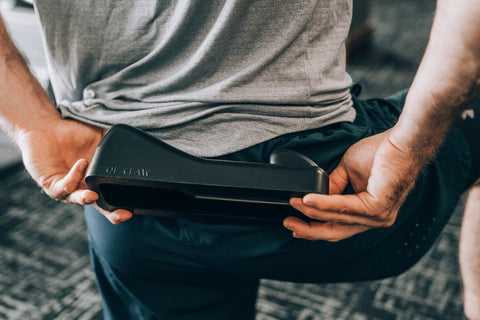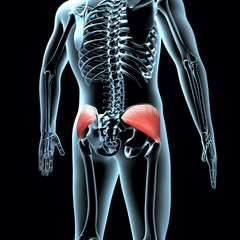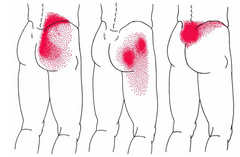Gluteus Medius is an upper buttock muscle that can cause a ton of lower back, upper glute, and outer glute pain when tight [1]. This post covers Gluteus Medius pain, its pain patterns and symptoms, and most importantly how to release it.
We use our QL Claw to perform Gluteus Medius release - learn more about our tool here.
Gluteus Medius Release with QL Claw
Gluteus Medius Release Placement:

Gluteus Medius Release Written Tutorial:


Placement: Sit with the tailbone directly on the ramp (the big end) of the Claw, and let the leg fall to the side - the trigger should dig right into Gluteus Medius right. Gluteus Medius is higher on the buttocks than Glute Maximus and Piriformis - Glute Medius is accessed right along the beltline (see anatomy image below for reference). You may need to reposition for a few seconds to find the tender spots in the Gluteus Medius... it is wide and there may be multiple knots and trigger points to work out.
Motion: Motion is crucial for Gluteus Medius release. Move the leg on the massage side up and down for a nice Gluteus Medius trigger point release. Another option for Gluteus Medius release is to generate motion from the opposite-side leg, shaking the body up and down on the trigger of the Claw.

Gluteus Medius Pressure Level 1: The Chicken Wing
Additional Pressure - The Figure Four: Cross the massage-side leg over the opposite knee in a figure-four position. Tilt the body into and away from the trigger (in a back-and-forth rocking motion) for deep, active Gluteus Medius release.

Gluteus Medius Pressure Level 2: The Figure Four
Additional Pressure - The Pretzel: From the Figure Four position, elevate the upper body onto the elbows. This will shift the weight from your upper back directly into the Gluteus Medius muscle for release.

Gluteus Medius Pressure Level 3: The Pretzel
How to know you've released a trigger point: When you release a knot/trigger point, you will feel the muscle give and will simultaneously feel the device sink into your body. A massage generally feels less painful under higher pressure once a trigger point is released.
Gluteus Medius Release FAQ:
How To Release Gluteus Medius
Deep tissue massage is the best way to release Gluteus Medius tension and relieve pain. Stretching after massage can further release the muscle, but massage is often required first to break up rigid, tight muscle tissue.
What Causes Tight Gluteus Medius?
Gluteus Medius tension can develop sharply from a single high-impact event (think jumping, lifting heavy, or running fast), or gradually from habits (think jogging for years without stretching or massaging, being too sedentary, or playing sports without warming up).
How Do You Release Gluteal Muscles?
Gluteus Medius release can be done by the hands of a trained professional, or at home with a purposefully made tool like QL Claw.
Beyond Gluteus Medius Release
Gluteus Medius Anatomy & Function:
Gluteus Medius is an upper-side glute muscle. It is the highest part of the buttock that has meat and can be described as the pocket of the hip.

Gluteus Medius Muscle
Gluteus Medius functions in hip abduction, keeping the body upright on one leg, and stability when carrying objects. When standing on your right leg, your right Gluteus Medius contracts to prevent you from tipping over to the left.

Gluteus Medius Pain Symptoms:
Gluteus Medius pain is typically worsened by physical activity. Complaints of Gluteus Medius pain can include pain after standing for too long, hiking, or walking [1]. Pain can be brought on by a single high-stress event such as lifting a couch [2]. After Gluteus Medius pain is present, sitting, walking, lifting, or doing anything physical can be very uncomfortable.

Check out our tutorials for releasing other low back pain-inducing muscles below!
Sources/Influences:
[1] Donnelly, Joseph M. Travell, Simons & Simons Myofascial Pain and Dysfunction: the Trigger Point Manual. 3rd ed., Wolters Kluwer Health, 2019.
[2] Davies, Clair, and Amber Davies. The Trigger Point Therapy Workbook: Your Self-Treatment Guide for Pain Relief. 3rd ed., New Harbinger Publications, Inc., 2013.



